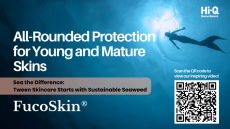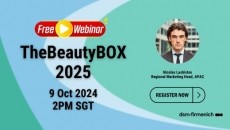Acne-friendly cosmetics: Indonesia’s Mad for Makeup tapping Gen Z base for co-creation and marketing

Founded in 2017 by an aesthetician, the Indonesian brand offers colour cosmetics ranging from serum concealer, lip moisturiser, serum mascara, and eyebrow pencil, as well as accessories such as makeup bags, blenders, and eyebrow curler.
Brand strategist Annisa Purnama and senior product research and experience strategist Trifena Krista said there was a distinct market gap for its products:
“Our founder was struggling with acne and felt that there is shame every time she has acne and has to put on make-up. With that, she’s created a make-up that is safe for acne by adhering to three principles.”
These are avoiding ingredients that could be irritating to the skin, that are hormone-altering or potentially cancer causing. Its hero ingredients include salicylic acid, centella asiatica, hyaluronic acid, and vitamin d3.
Its best-selling product is the Spotless Second Skin Serum Concealer that comes in eight colour tones. The brand claimed that it was the “first serum-infused acne-safe and anti-creasing concealer in Indonesia.”
The products are also halal production certified. Purnama explained: “From a marketing perspective, we can say that it’s quite important to highlight that the products are halal certified. We eventually want to make our product halal ingredients-certified [instead of just production certified].
“Indonesia is one of the largest Muslim countries in the world and halal certification plays a big role in our customers’ consideration to try the product.”
Given the success of its concealer product, its NPD is channelled towards expanding the base products’ line as well as expanding the colour tones.
“There is one undertone that is rarely produced in the Indonesian market but a lot of Indonesian consumers have this undertone, which is olives. So, we might come up something in olive undertone. We want to make the concealer more inclusive for our consumers.”
Community as key in the culture of beauty industry
Alongside a need for acne-friendly cosmetics, the brand added that its other proposition is its beauty community known as the Rebel Secret Society.
“We have now the largest beauty community in Indonesia with 1,000 plus members and we want to continue to solve their problems because it’s more than just a product and we want to continue building that culture in the industry.”
Its products target Gen Z users where acne-prone skin emerged as the top skin problem. Its target demographic also explains why the brand looks to Instagram to build a community among its users.
Its Instagram profile features videos of social media influencers trying out and reviewing the products and organizing face-to-face social gatherings to connect users over similar interest in cosmetics.
“During the pandemic, they start to self-sustain by hanging out together on their own. For us, we facilitate that by making them affiliates for our marketing and giving them incentive for doing that.
“Of course, the community is not there for the sake of it as we also co-create our products with them by asking them what make-up we should do next, what kind of marketing do they want to see from us.”
Grand export ambitions
Currently, the products are only made available in Indonesia and Singapore via ecommerce Shopee.
Within Indonesia, it added that 55% of sales are via Shopee, Tokopedia, and Lazada, with 42% in local retail stores via Sociolla and Beauty Haul, and 3% via word of mouth.
The brand is looking to increase its distribution channels to include department stores and pharmacies as well in Indonesia, as well as in Singapore.
It teased that it is exploring the markets in Australia, United States and Europe but is still in the “really early stage of researching the regulations and what to prepare”. It will be targeting the Asian-American consumers in these countries.
“We hope to represent more of South East Asian make-up in these countries. As well as to focus on the Asian-American niche in these countries as they haven’t been well-represented by the make-up that is availability, and right now we see the opportunity to fill the gap in the market.”



![Coty is counting on China’s prestige fragrance boom to drive ambition to drive China growth. [Chloe Fragrances]](/var/wrbm_gb_food_pharma/storage/images/_aliases/wrbm_medium/publications/cosmetics/cosmeticsdesign-asia.com/headlines/business-financial/coty-aims-to-double-china-sales-to-over-600m-on-the-back-of-prestige-fragrance-potential/16228009-1-eng-GB/Coty-aims-to-double-China-sales-to-over-600m-on-the-back-of-prestige-fragrance-potential.jpg)
















